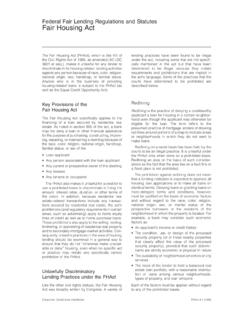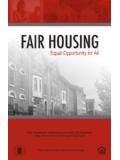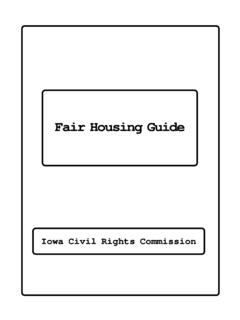Transcription of Understanding the Fair Housing Amendments Act
1 A Publication of United Spinal AssociationUnderstanding the FairHousing Amendments ActIntroduction ..1 Who is protected? ..1 Types of Housing facilities covered ..2 Prohibited actions ..2 Reasonable accommodations ..4 Policy changes ..7 Accessibility requirements in new construction ..7 Complaint process ..9 Remedies and damages ..11 Cases & settlements ..12 Questions & answers ..19 General information ..22 United Spinal Association120-34 Queens Blvd. #320 Kew Gardens, NY 11415 Phone: 718-803-3782 Website: the fair Housing Amendments ActOur Mission United Spinal Association is a national 501(c) (3) nonprofit membership organization dedicated to enhancing the quality of life of all people living with spinal cord injuries and disorders (SCI/D), including veterans, and providing support and information to loved ones, care providers and professionals.
2 We believe no person should be excluded from opportunity based on their disability. Our goal is to provide people living with SCI/D programs and services that maximize their independence and enable them to remain active in their communities. United Spinal transforms the lives of people with SCI/D by: Advocating for greater access to healthcare, mobility equipment, public transportation, rehabilitation, community services and supports, and the built environment Empowering our members with resources, one-on-one assistance, and peer support Promoting independence through employment opportunities and community integration of wheelchair users into mainstream society Our History United Spinal was founded in 1946 by a determined group of paralyzed WWII veterans in New York City who advocated for greater civil rights and independence for themselves and their fellow veterans.
3 Rejecting the poor treatment they received at their local VA hospital, they decided to form a support group. From these modest beginnings, United Spinal was born. Since then, our core belief has remained unchanged. Despite living with SCI/D, a full, productive, and rewarding life is within the reach of anyone with the strength to believe it and the courage to make it Spinal AssociationUnderstanding the fair Housing Amendments Act1 IntroductionThe fair Housing Amendments Act (FHAA) wassigned into law on September 13, 1988, and becameeffective on March 12, 1989. The Act amends TitleVIII of the Civil Rights Act of 1968, which prohibitsdiscrimination on the basis of race, color, religion, sexor national origin in Housing sales, rentals orfinancing.
4 The FHAA extends this protection topersons with a disability and families with law is intended to increase Housing opportunitiesfor people with disabilities. However, individualcitizens must come forward with concerns, filecomplaints or sue if they believe their rights havebeen violated. The government has no other way ofdetecting discrimination as it occurs. As a result, it isimportant to understand this legislation and how tomake it work for the fair Housing Amendments Actwillhelp both persons with disabilities and advocatesbetter understand the FHAA. This brochure willexplain the law and how to make the law work forpeople with is protected?
5 The FHAA added persons with a handicappingcondition, along with families with children, asprotected classes under the Civil Rights Act. Thelegislation adopts the definition of handicappingcondition found in Section 504 of the RehabilitationAct of 1973, as amended. This definition includes anyperson who actually has a physical or mentalimpairment, has a record of having such animpairment, or is regarded as having such animpairment that substantially limits one or moremajor life activity such as hearing, seeing, speaking,breathing, performing manual tasks, walking, caringfor oneself, learning or of Housing facilitiescoveredThis law pertains to all types of Housing , whetherprivately or publicly funded.
6 Some examples of typesof facilities include, but are not limited to,condominiums, cooperatives, mobile homes, trailerparks, time shares, and any unit that is designed orused as a residence. It also includes any landor vacant property, which is sold or leased asresidential property. Prohibited actionsThe FHAA prohibits a wide array of activities thatdiscriminate against persons with disabilities andfamilies with children in the sale or rental of following specifically outlines illegal actions: Refusal to sell or rent a dwelling unit whena bona fide offer has been made, where therefusal is based on race, color, religion, sex,disability, familial status or national origin.
7 Imposing different terms and conditions ortreating people differently with theprovision of service because of race, color,religion, sex, disability, familial status ornational origin. Discouraging an individual from living ina community or neighborhood, if therestriction is based on race, color, religion,sex, disability, familial status or nationalorigin. This activity is frequently referredto as steering. Advertising, posting notices or makingstatements in such a way as to deny accessto an individual if that denial is based onrace, color, religion, sex, disability, familialstatus or national the fair Housing Amendments ActUnderstanding the fair Housing Amendments Act Misrepresenting the availability of adwelling because of the applicant s race,color, religion, sex, disability, familialstatus or national origin.
8 Blockbusting by encouraging the sale orrental of a dwelling by implying that peopleof a certain race, color, religion, sex,disability, familial status or origin areentering the community in large FHAA expands the traditional list of prohibitedactivities to actions, which relate directly todiscrimination based on disability. The following areexamples of such activities: It is illegal for a landlord to refuse to allowa tenant with a disability to makemodifications, at the tenant s expense,which would permit the tenant to fullyenjoy the premises. The landlord can,where reasonable, require the tenantto restore the interior of the premises tothe condition it was in prior to themodification.
9 Premises are defined toinclude interior and exterior , refusing to permit a tenantto make modifications to a lobby,entryway, parking lot or laundry room, isalso discriminatory. This is discussedin greater detail in the reasonableaccommodations section. Asking a question designed to determinewhether an applicant or anyone associatedwith that applicant has a disability isunlawful under FHAA. However, the Actdoes provide for certain inquiries, providedthey are asked of all applicants whether ornot they have a Housing provider may ask: If an applicant can meet the financialrequirements of ownership or tenancy; If an applicant is eligible for Housing thatis available only to persons with adisability or a specific disability; If a person is eligible for a priorityavailable only to persons with a disabilityor a specific disability; If a person is a current substance abuser.
10 If an applicant has ever been convicted ofthe illegal manufacture or distribution of acontrolled AccommodationsFHAA requires two types of reasonableaccommodations to make existing Housing moreaccessible to persons with disabilities. Theseaccommodations consist of structural modificationsand policy modificationsHousing providers must permit reasonablemodifications of existing premises if suchmodifications are necessary for a person with adisability to be able to live in and use the cost of the modification is to be paid by theresident with a the fair Housing Amendments ActUnderstanding the fair Housing Amendments ActModifications may be made to the interior of theindividual s unit as well as any public and commonuse areas of a building, including lobbies, hallways,and laundry may be requested in any type ofdwelling.






